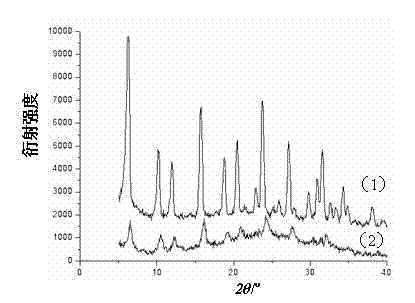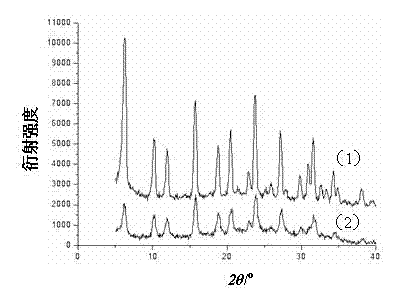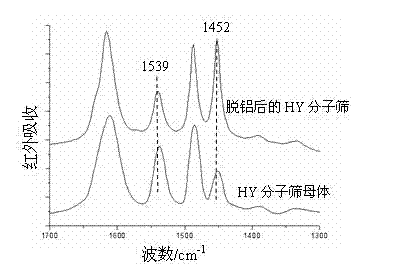Dealuminzation method of hydrogenous and ammonic Y,ZSM-5,beta and SAPO-34 molecular sieves
A ZSM-5, molecular sieve technology, applied in the direction of molecular sieve characteristic silicoaluminophosphate, molecular sieve and alkali-exchanged phosphate, crystalline aluminosilicate zeolite, etc., can solve the problems of complicated preparation process and uneven degree of molecular sieve dealumination. , to achieve the effect of easy control of the degree of dealumination and a wide range of dealumination
- Summary
- Abstract
- Description
- Claims
- Application Information
AI Technical Summary
Problems solved by technology
Method used
Image
Examples
example 1
[0046] Put 1 g of hydrogen-type Y molecular sieve (HY, SiO2 / Al2O3=5) (pressed and sieved into 20-40 mesh) in a quartz fixed-bed reactor, and feed pure N2 at 500 °C to pretreat the zeolite for 40 min to remove the moisture. Lower the bed temperature to 250 ° C, at this temperature, the CCl4 concentration of 5% CCl4 / N2 mixed gas is passed into the reactor at a flow rate of 300 ml / min to dealuminate the hydrogen-type Y molecular sieve12 min. Then the above mixed gas was switched to pure N2, the bed temperature was raised from 250 °C to 400 °C, and the sample was purged at a flow rate of 300 ml / min for 40 min. The XRD pattern of the molecular sieve after the gained dealumination and the original parent hydrogen type Y molecular sieve is as follows: figure 1 shown. It is measured that the dealumination process results in a dealumination amount of the hydrogen-type Y molecular sieve of 173.5 mg (calculated as Al2O3).
example 2
[0048] Repeat example 1, but the mixed gas that will be used for the dealumination of hydrogen type Y molecular sieve is that the CCl4 / N2 of 5% is changed to the CHCl3 / N2 that the concentration of CHCl3 is 300 ppm by the concentration of CCl4 for the dealumination of hydrogen type Y molecular sieve, meanwhile, the flow rate of mixed gas is changed to 600 ml / min, the dealumination time was extended from 12 min to 1 h. The XRD pattern of the obtained molecular sieve after dealumination is similar to that of the original parent hydrogen type Y molecular sieve. It was measured that the dealumination process resulted in a dealumination amount of hydrogen type Y molecular sieve of 8.9 mg (calculated as Al2O3).
example 3
[0050] Repeat Example 1, but shorten the dealumination treatment time of hydrogen type Y molecular sieve from 12 min to 4 min. It was measured that the dealumination process resulted in a dealumination amount of hydrogen type Y molecular sieve of 62.8 mg (calculated as Al2O3). The XRD pattern of the molecular sieve after the gained dealumination and the original parent hydrogen type Y molecular sieve is as follows: figure 2 shown. The obtained dealuminated molecular sieve samples and the original parent hydrogen-type Y molecular sieve samples were measured by pyridine adsorption infrared spectrum at 400 ℃. Depend on image 3 It can be seen that the infrared absorption of the dealuminated molecular sieve by this method is nearly 3 times that of the dealuminated molecular sieve at 1452 cm-1, which indicates that the strong Lewis acid content of the dealuminated molecular sieve by this method is nearly 3 times that of the original parent hydrogen-type Y molecular sieve. times...
PUM
 Login to View More
Login to View More Abstract
Description
Claims
Application Information
 Login to View More
Login to View More - R&D
- Intellectual Property
- Life Sciences
- Materials
- Tech Scout
- Unparalleled Data Quality
- Higher Quality Content
- 60% Fewer Hallucinations
Browse by: Latest US Patents, China's latest patents, Technical Efficacy Thesaurus, Application Domain, Technology Topic, Popular Technical Reports.
© 2025 PatSnap. All rights reserved.Legal|Privacy policy|Modern Slavery Act Transparency Statement|Sitemap|About US| Contact US: help@patsnap.com



